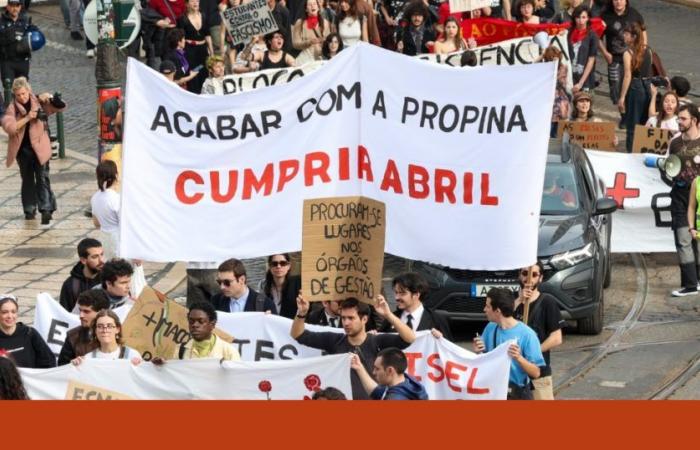It was to the sound of April songs that a few thousand students from different universities in the country paraded this Thursday through Lisbon, from Rossio to the Assembly of the Republic, to demand “scholarships yes, tuition fees no” and greater access to accommodation and housing.
The initial meeting point was scheduled for downtown Lisbon, where at 2:30 pm there was still no indication of the “largest mobilization of students in the last 15 years”, promised to P3 by Renato Daniel, president of the Coimbra Academic Association. It was only with the start of the march that the students representing the academic community, from Trás-os-Montes to the Algarve, or Madeira, showed their weight in the streets. With colorful posters, dressed or “in civilian clothes”, they brought slogans, dance and the symbolic songs of José Afonso to the city’s streets, leading to the closure of several roads.
From the sky, carnations rained: it was from the Santa Justa elevator that they launched them, and from where a long banner spread that read that “April is the future”. And it was in this tone, with references to the past but with eyes on the future, that the young people, even though they claimed that “the bribes hurt”, also said that there were “many, many thousand, to continue April”.
Carolina Bastos Pereira
The call for the demonstration initially came from students at the Faculty of Social and Human Sciences (FCSH) at Universidade Nova de Lisboa. To P3, the president of the respective student association, Guilherme Vaz, explains however that the initiative was designed by “a group of nine student associations”, including two from Porto and one from Caldas da Rainha. For Vaz, the demonstration, which also anticipates national student day (this Sunday, March 24), “takes on another color” in light of the 50th anniversary of the carnation revolution. “The role of student associations [perante o problema da habitação] It’s limited, but the means we have are these, coming to the streets”, he said.
The initiative had national support, as was seen and heard, for example, by the presence of a student from the University of Madeira on the stage in front of the Assembly of the Republic, where the arrival of the protesters was awaited. Even students from the University of Porto — whose Academic Federation (FAP) decided not to join the march, opting instead to organize a student event in Aliados, on Wednesday — were present along with students from the Faculty of Fine Arts and the Faculty of Architecture . Students from the School of Arts at the Catholic University were also present. “It is necessary to fight not only against the emigration of young people, but, for example, for the end of tuition fees or for more social action”, said Constança Martins, from the Faculty of Fine Arts of the University of Porto, who criticized the absence of the FAP: “ They should have been present here today with the rest of the students.”
The demand for better transport was also heard in the protest, particularly through the voices of students from the universities of Évora and Aveiro. “There are university centers on the outskirts, for example in the industrial zone, and we only have two buses in the morning and two in the afternoon to go there”, said Iria Andrade.
The Academic Association of Coimbra (AAC) was also present in force, which mobilized around two hundred students, almost all dressed up.
Carolina Bastos Pereira
Also note, despite the atmosphere of fraternity, the tension between elements of the student movement and other groups. To P3, Sofia Ramos, a student at the University of Coimbra, explained that she is part of a pro-Palestinian activist organization and that she was, at the beginning of the protest, forced to go “to the end of the march”, together with her group and other movements. “We were joining the chants and the demonstration, we simply felt it was important to claim the rights of Palestinian students, who also need to be protected”, she explains. Upon arrival at the Assembly of the Republic, Sofia’s group was “aggressively expelled” by other students, she claims. She says that she was “wrapped up in her own banner”, which displayed the Palestinian flag, and was “pushed”, as well as her colleagues, by other protesters. Climate activism groups, who were present and released green smoke into the air, were also pushed. According to Sofia Ramos, the police, who were present in large numbers at the scene, did not intervene.
“Green years” of an April that “did not fail”
On social media, the demonstration promised as its motto “roof and housing, a right to education”, but the phrase that was most heard in the speeches given in front of the Assembly of the Republic was “we want more April here”. And there were a myriad of demands mentioned: not only more affordable rents but also the application of the Recovery and Resilience Plan in the construction of public residences, the end of bribes, the brake on rising prices in canteens (“In Lisbon, before they were 2.79 euros and now it will be 3 euros”, a student explains to P3), the review of the legal regime of higher education institutions (RJIES), or the end of “police repression” and “homophobia and transphobia” in schools, mentioned by students such as Marta Boavida , from the Faculty of Arts of the University of Lisbon, who also mentioned the poor general condition of the buildings where he studies.
There were also more specific demands. Margarida Isaías, president of the Academic Association of the University of Minho, told P3 that her institution’s canteens are not open on the weekends, and that “there is no kitchen in the residences” that served as an alternative. Cecília Bastos, a student at the Escola Superior de Teatro e Cinema, in Amadora, warned that the building where she studies, because it was “built on water, is sinking, and every year that passes, inspections prove that it is collapsing”.
Carolina Bastos Pereira
The march lasted almost until 6pm, and along the way, several times, fragments of songs by José Mário Branco, Sérgio Godinho, José Afonso or even José Pinhal, the popular singer with the which the young people identified with when he sang “but I can’t”.
On the van stage set up in front of the Assembly of the Republic, several representatives of student bodies highlighted the political moment, with a new Government about to take office, as an opportunity to convey their warnings.
It was up to the president of the Student Association of the Escola Superior de Artes e Design (ESAD) of Caldas da Rainha, Violeta Santos, to close the rally with a new reference to the historic anniversary that will be marked next month: “From this seed we will reap April”.
Carolina Bastos Pereira
And April was heard, for example, in the “viva ao SAAL” sung by Architecture and Fine Arts students, in reference to the low-cost social housing program, the Local Outpatient Support Service, launched during PREC, in the post -25 April, and subsequently abandoned. As we heard green yearsby Carlos Paredes, played by students from Coimbra, in Grândola, dark village sung in unison, or in Come five more. “Don’t make me come out into the street and shout”, they sang in front of Parliament. In a tone of challenge, or of promise.
Text edited by Pedro Guerreiro
Tags: Cape cassock poster hand students streets asked April Report
--





